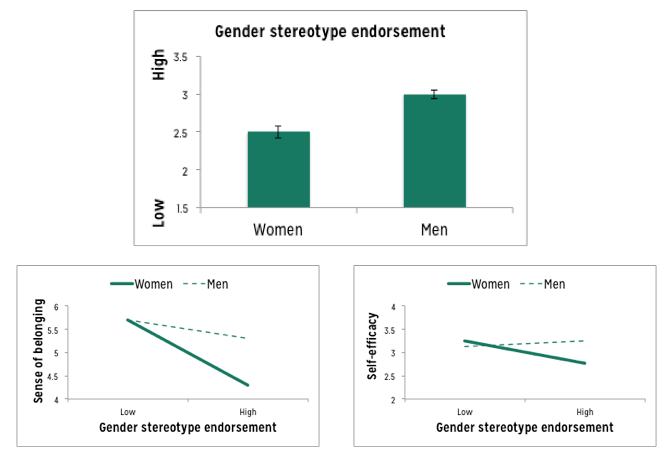Computing Research News
September 2014 Vol. 26/No.8
Center for Evaluating the Research Pipeline Infographic September 2014
By Jane Stout, CERP Director
Women who endorse the negative stereotype that women are less capable in
computing than men feel low belonging and self-efficacy in computing

One hundred eighteen graduate students (n = 75 women, n= 143 men) indicated (a) the degree to which they endorse the stereotype that women are less capable in computing that men; (b) how much they felt they “belong” in computing and (c) their self-efficacy in computing. Men endorsed the negative stereotype to a greater degree than women, p < .01. However, among women, stronger endorsement of the negatively stereotype was associated with a lower sense of belonging and lower sense efficacy in computing, ps < .05; men’s stereotype endorsement was unrelated to their belonging and self-efficacy. These results highlight the importance of fostering a stereotype-free training environment so that women’s self-concept in computing is unconstrained by negative cultural beliefs about their ability.
Note: Stereotype endorsement Stereotype endorsement was assessed by asking students to indicate their agreement with and aggregating the following items: Although some women might be good at computing, women in general tend to be better at other things; there is no doubt in my mind that women are just as talented at computing as men are (reverse scored); Computing fits men’s personalities better than women’s; Computing seems to come more naturally to men than women, using a scale ranging from (1) Strongly disagree – (7) Strongly agree. Belonging was assessed by asking students to indicate their agreement with and aggregating the following items: I feel like I belong in computing; I feel like an outsider in the computing community (reverse scored); I feel welcomed in the computing community; Computing is a big part of who I am; I do not have much in common with other people in computing (reverse scored); I see myself as a computing person, using a scale ranging from (1) strongly disagree – (7) strongly agree. Self-efficacy was assessed by aggregating the following items regarding students’ confidence that they could do the following: Become the go-to person for expertise in your content area; Publish papers as first author in the top journals of your field; Discuss theory with senior members of your field; Win awards for your work; Articulate thoughtful answers to theoretical questions about your work during a presentation; Successfully receive funding for a grant on which you are the Principle Investigator (PI); Become a respected member of the research community in your research area, using a scale ranging from (1) Not at all confident – (5) Extremely confident.
 This analysis brought to you by the CRA’s Center for Evaluating the Research Pipeline (CERP). Want CERP to do comparative evaluation for your program or intervention? Contact cerp@cra.org to learn more. Be sure to also visit our website at http://cra.org/cerp/.
This analysis brought to you by the CRA’s Center for Evaluating the Research Pipeline (CERP). Want CERP to do comparative evaluation for your program or intervention? Contact cerp@cra.org to learn more. Be sure to also visit our website at http://cra.org/cerp/.
1828 L STREET, NW SUITE 800, WASHINGTON, DC 20036 | P: 202-234-2111 | F: 202-667-1066




